- Home
- Captain W E Johns
23 Biggles Sees It Through
23 Biggles Sees It Through Read online
CHAPTER I
An Eventful
Reconnaissance
From twenty thousand feet Squadron-Leader James Bigglesworth, D.S.O., better known to his friends as `Biggles',
looked down upon a world that revealed no more signs of occupation than the moon.
From time to time his eyes, whimsical and Faintly humorous, switched to the atmosphere around him, and then settled for a moment on the bewildering array of dials that smothered his instrument board. His eyes ran over them swiftly, for years of experience enabled him to read them as easily as of schoolmaster reads a book. Once in a while he glanced at his companion sitting in the second pilot's seat, Flight-Lieutenant the Hon.
Algernon Lacey, D.F.C., and, still more rarely, behind him at the slim, watchful figure of Flying-Officer 'Ginger' Hebblethwaite, manning the centre gun-turret of the Bristol Blenheim. The fourth occupant of the aircraft, Flight-Sergeant Smyth, master mechanic, he could not see, for he was squatting humped up over a gun in the tail.
For nearly four hours these positions had been maintained with practically no variation, each airman concentrating on his
particular task to the exclusion of all else, knowing full well the penalty of relaxation in the most deadly form of warfare devised by human ingenuity — war flying, wherein mercy is never expected and rarely encountered. During the whole of the four hours nothing had happened; the engines roared, the propellers slashed their way through air that was frozen into immobility, the instrument needles quivered. Far to the north the rim of the sun, a slip of glowing crimson, just showed above a jagged horizon that was the Arctic Circle, and shed an eerie twilight on a world of ice-bound desolation.
So this, thought Ginger, surveying the frozen panorama from his glass-protected turret, was Finland. He had been eager enough to go with the others when the Air Ministry had allowed Biggles to accompany a party of volunteers to help the Finns in their struggle against Soviet aggression, but now that he was there he saw no reason to congratulate himself. They had been in Finland only a week, but as far as he was concerned it was enough. Practically forbidden to fly over Russian territory, their work had been confined to long-distance reconnaissance raids along the frontiers, and since they encountered little opposition, and there was nothing to see on the ground except snow, it was becoming monotonous. Presently they would return to their base at Oskar, where they would have to spend an hour swathing the machine in rugs to prevent the oil from freezing. Tomorrow there would be another uneventful reconnaissance. Yes, it was becoming monotonous. He yawned.
At the same moment Biggles's voice came from the internal communication transmitter at his elbow.
Ènemy aircraft on the starboard quarter. Stand by to attack.' Simultaneously with the words the Blenheim banked and dived steeply for speed.
Faintly above the roar of the racing engines came Biggles's voice, singing: 'Roll out the barrel....'
As he swung his turret to face the field of attack, Ginger's lips rsed up to echo the catchy tune. He saw the enemy aircraft ,it, once, a Polycarpov bomber, one of the type being used by the Russians for the bombing of Finnish towns. It was also diving
for home, proving that the pilot had seen them.
Biggles's lips parted in a smile, for he knew that he had thèlegs' of the Russian.
Steeper and steeper became the Russian's dive as he sought escape in sheer speed, but steeper, too, became the dive of the Blenheim.
Ginger aligned his gun, bracing himself against the terrific drag of centrifugal force, and waited. The Russian seemed to swim towards them, sideways. But still he waited. The distance between the two machines closed; the Russian was no longer misty grey, but clear and dark. Jabs of orange flame showed where the Russian gunners were already firing.
Straight under the enemy machine Biggles dived, and then rocketed upwards, and the Blenheim vibrated slightly as its guns began to stutter.
The front gun having fired its burst, the Blenheim turned slowly, giving Ginger and Smyth in the rear seat their chance. Both took it: their guns roared as one.
The dive of the Soviet bomber steepened for a moment, then its nose jerked upwards. Ginger gave it another burst — he was very close now. Smyth's gun took up the staccato chatter, and a stream of bullets played a vicious tattoo on the Russian's cockpit. It dropped a wing and fell sideways into a spin. The fight was over.
Biggles brought the Blenheim to an even keel and watched the Russian go down, ready to renew the attack should the spin turn out to be only a trick; but it was no sham. Black, oily smoke began to pour from its side; the cantilever wing broke across the middle, and the fuselage plunged earthward like a huge torpedo. It seemed to go on falling for a long time, long after it looked as if it must have reached the ground. But the end came at last. Clouds of snow mingled with the black smoke as it struck the frozen earth and spread itself in a thousand splinters over an acre of ground.
Biggles glanced at Algy, and for a moment their eyes met. Both faces were expressionless, for they had seen the same thing happen too many times to be upset by the dreadful spectacle. It was an unpleasant but inevitable part of air fighting.
Humming quietly, Biggles turned away and began to climb for height, but his eyes were on the ground, making a hasty reconnaissance while they were so close to it. Suddenly his tune broke off short and his body stiffened, his eyes focused on a speck that moved slowly across a flat sheet of ice which he knew to be the frozen surface of one of the hundreds of lakes that form a major part of the Finnish landscape. On one side of it a ridge of black rock projected through the snow like a crocodile's back; near it was a small dark object that seemed to stagger, fall, and then stagger on again, only to fall once more.
Biggles spoke tersely. 'What d'you make of it?'
Ìt's a man,' returned Algy briefly, his eyes on the object. `That's what I thought.'
The Blenheim's engines faded into a moan that was like the death-cry of a dying giant, and the machine sank earthward. The wind sighed over wings and fuselage.
At a height of a hundred feet Biggles circled the man on the ground, now lying where he had last fallen.
`He's all in, whoever he is,' remarked Algy.
Biggles made a swift survey of the lake's icy surface.
Algy guessed what was in his mind. 'Are you thinking of going down?'
Ì don't like it, but I think we must. We can't leave the poor blighter to die.'
Ìt seems silly to risk four lives to save one — particularly when ten thousand men are dying every day along the Mannerheim Line.'
Ì agree, but this isn't quite the same thing. If I don't try to save him, the thought of that poor wretch lying out here in the snow will spoil my sleep tonight. It'll spoil yours, too, so don't kid yourself.'
Àll right — go ahead.'
`Stand by to land,' called Biggles into the microphone to warn the gunners of his intention.
He brought the machine down very carefully, his hand on the throttle ready to zoom again the moment an obstacle showed itself. But there was none; the surface of the frozen lake was like powdered glass, and the Blenheim ran to a smooth standstill some thirty yards from where the motionless form was lying.
Biggles studied the sky carefully in all directions before he would allow anyone to get out; then he slipped his emergency brandy flask into his pocket, climbed down, and with Algy and Ginger following, walked quickly towards the body. Over everything hung the silence of death. Nothing moved.
Biggles was first to reach the unknown man, who, it was now seen, was old and grey. He dropped on his knees, and lifting up the limp head, stared down into a face that was pinched with cold and thin from suffering. The eyes were open. Unscrewing the top
of his spirit flask with his teeth, he coaxed a little of the brandy between the blue lips.
The man coughed instantly as the fiery liquid stung his throat; its effect was instantaneous and he struggled into a sitting position, muttering something in a language that none of them understood.
Biggles had picked up a few words of Finnish since he had been in the country, and he tried them, but they appeared to convey nothing. He tried French, but the man only shook his head. Finally, in desperation, he tried English. 'Who are you?' he said.
To his amazement the man answered in the same language.
Àre you — English?' he said.
Biggles replied, 'Yes, we're English. Who are you, and what are you doing here? But perhaps you'd better not try to talk yet; we'll carry you to our 'plane and get you somewhere safe.'
The old man shook his head. 'No,' he breathed with difficulty. Ìt's — too late.'
`Too late? Surely not.'
`You don't understand. I am wounded — by — a bullet. What I have to say I must say now, or it will be — too late — and it is — important.'
`We'll get you into the machine, anyway,' declared Biggles. `No — I implore you. When I die you must leave me here.' Biggles stared.
Ìf you take me somewhere — I may be — recognized — by a spy, and then it would be known — that I had — escaped. It would be better if it were thought that I had died —
without speaking.'
Biggles looked nonplussed, but he nodded. 'Very well,' he said. Ì gather there is something you want to tell me. Here, have some more brandy; it may help you.'
The old man drank the spirit gratefully, and it brought a faint flush into his sunken cheeks. 'Yes; listen carefully,' he said. 'I am a Pole. I was a scientist working for the government in Warsaw. When the Germans marched into Poland I was on the point of concluding important experiments with metal alloys for aircraft — experiments that might well revolutionize the whole business of metal aircraft construction. Rather than destroy the fruits of seven years of labour, I put all my papers in a portfolio, and sought to escape so that I could give them to the Allies. But then it was hard to get out of my unhappy Poland. To make matters more difficult, the Germans knew all about me and my work, and when they found that I had gone they pursued me; they hunted for me everywhere. All frontiers were closed. There was only one way I could get out — by air. Our pilots were flying to neutral countries to save their machines.
I found one willing to help me, and we fled to Russia, only to find that the Russians, too, had marched against us. We had only a little petrol left, so we tried to get to Finland. But the German Secret Service learned of my escape by aeroplane and traced it to Russia; they knew the number of the machine, and we had no means of painting it over. German pursuit 'planes flew over Russia to catch us, and they were close enough to shoot at us when we flew into a blizzard near Lake Ladoga. I had been hit by a bullet, and, although I did not know it, so had my pilot; but he flew on until the petrol gave out. Where we came down I don't know, for we had been lost in the blizzard, but we crashed into the side of a frozen lake, which must be one of the smaller lakes near Lake Ladoga.'
Ìn Finland or in Russia?' put in Biggles quickly.
Ì'm not sure — Finland, I hope. But let me finish. My brave pilot died there. I knew that the German and Russian 'planes
would still be looking for us, so rather than risk the papers falling into their hands, I hid the portfolio under some rocks near the wrecked 'plane. Then I started walking westward, hoping to meet some friendly Finns. But I saw no one. I had no food. It began to snow. I have been walking for three days, I think – I don't know how long. Give me – brandy.'
Biggles saw that the old man was near the end, for the shadow of death had already settled on his pale face. There was nothing more he could do except try to prolong the old man's life for a little while with the brandy.
`What is your name, sir? We ought to know,' he asked.
'Petolski. England knows of me. You must get the papers, but you must be quick or the Russians or the Germans will find them.'
`Can you give me any clearer directions for finding them?' `They are about fifty paces east of the broken 'plane, under a large rock.'
Ànd how far is the lake from here?'
`Twenty – thirty – perhaps forty miles. I don't know. I may have – wandered. Tell – tell
—' The old man's head had begun to droop. A shadow had crossed his eyes, which were staring unseeingly into the sky.
Biggles moved the flask nearer to the lips, but stopped suddenly as the body went limp in his arms. 'He's gone – poor old fellow,' he said quietly, and allowed the body to sink slowly to the snow-covered ice.
`What are we going to do with him?' inquired Al . 'I know he said we were to abandon him, but I hate the idea of just leaving the poor old chap lying here —' He broke off short as a yell came from Smyth.
The three airmen sprang to their feet. Simultaneously they heard the roar of an aero engine suddenly switched on. One glance was enough. Flying low, racing towards the spot, was an aeroplane, a German Messerschmitt.
`Quick!' snapped Biggles. 'Get aboard!' He dashed to the Blenheim.
Had the Messerschmitt pilot been a little less impetuous, or had he been a better shot, the affair might well have ended there and then, for he got in his first burst while the Blenheim was still on the ground. True, Biggles, realizing his danger, jerked the throttle wide open, and the instant the machine began to move he jammed on one wheel brake, producing a skid so violent that Smyth, sitting in the tail, was nearly sick. Before the Messerschmitt could turn and fire again Biggles had his machine in the air, following the German and keeping underneath him, thus rendering his deadly front guns ineffective, although from this position Ginger had a clear view of the sleek fuselage. It may be that some of his shots took effect, for the Messerschmitt swerved away. Biggles seized the opportunity to bank steeply in the opposite direction, so that in a few seconds the two machines were a mile apart. He knew his business too well to fool about with a machine of higher manoeuvrability so far from home.
Keeping the stick forward, he tore westward with his wheels only a few feet from the ground, a position calculated to hamper the German pilot should he resume the attack, in that his speed would be chopped for fear of overshooting his mark and hitting the ground. The Messerschmitt did, in fact, chase the Blenheim for a I ittle while, but it did not press the pursuit home, and when the German pilot suddenly turned back on his course Biggles guessed the reason: he had spotted the lonely figure on the ground.
Biggles actually turned the Blenheim, hoping to catch the Messerschmitt at rest on the lake as he himself had nearly been caught, but his ever watchful eyes picked out several other specks in the sky coming from the Russian frontier and he decided to let well alone. He pulled his nose round again to the west and headed for Oskar, which he reached some time later without further incident.
Leaving the others to attend to the machine, he borrowed a car and went straight down to Helsinki, no great distance away, where he reported to the British Consulate, feeling that the infor-mation he now possessed was too valuable to be lost.
It was nearly dark when he got back to Oskar, where he found the others congregated round the stove in the general mess, for the aerodrome was used by several units of the Finnish Air Force beside the International Squadron. However, he took them on one side and gave them the result of his mission.
'The Consul rang up London,' he said quietly. 'Ten minutes later Intelligence came through and I spoke to Colonel Raymond. It seems that our people know all about Petolski and his researches, so I wasn't surprised when Raymond asked me to try to get hold of the portfolio. He seemed mighty anxious about it, too. We've got to spare no effort to get those papers. If we can't get them ourselves we must at all costs prevent Germany getting hold of them.'
'How?' inquired Algy naively.
'How the deuce do I know!' returned Biggles. Ìf we get them o
urselves the Boche can't get 'em.'
'The Boche know about these papers?'
'Yes, Petolski told us so himself'
'Then we look like having a lovely time playing hide and seek in the snow with a bunch of Huns.'
shouldn't be surprised at that,' admitted Biggles. 'Pity that confounded Messerschmitt came along. We can reckon that they found Petolski's body.'
'Which means that since they knew he escaped by air, they'll be looking for his crashed '
plane, hoping the papers will still be in it.'
Biggles nodded. 'We've got to get to it first.'
'When do we start?'
At dawn. It's no use sitting here thinking about it; that won't get us anywhere. We may not come back.'
'You're telling me!' sneered Algy.
'What I meant was, not immediately. We'll take enough grub to last for two or three days, and some spare cans of petrol. I'll make a list of other things that might come in handy —
things like skates.'
Algy started. 'Skates! Say, what is this — winter-sports?'
Biggles smiled. 'You've said it, laddie. Incidentally, it wouldn't be a bad idea if we took some white sheets to wrap ourselves in, for camouflage, as the Finns do.'
`Ha! Corpses on skates,' gibed Al don't know what war's coming to.'
'You'll find out,' Biggles grinned.
Why not paint the tops of our 'planes white, so that if any Huns come along they won't be so likely to spot us?' suggested Ginger.
'That's an idea,' agreed Biggles. T11 get the fellows on to it right away.'
`How about some snow-shoes, some skis, and a sledge or two?' suggested Algy sarcastically.
'Don't be a fool. This is no laughing matter — as you may discover if we run out of petrol and have to start walking.'
'I always did hate walking — you don't seem to get any place,' muttered Algy disgustedly.
Ì'm not so keen on hiking myself,' admitted Biggles. 'You get your feet wet.'
'Absolutely. Ah, well, it may not come to that. Let's turn in; we may as well start fresh,'
advised Biggles.

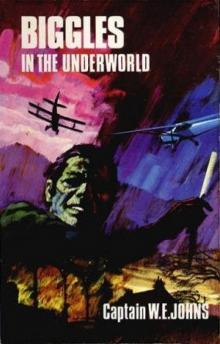 Biggles in the Underworld
Biggles in the Underworld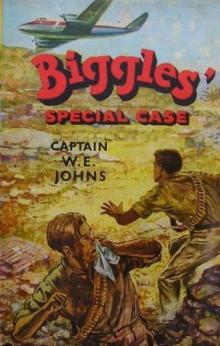 Biggles' Special Case
Biggles' Special Case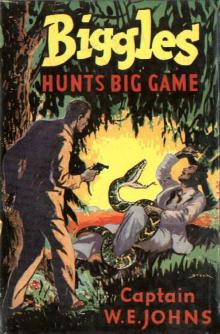 34 Biggles Hunts Big Game
34 Biggles Hunts Big Game 03 Now To The Stars
03 Now To The Stars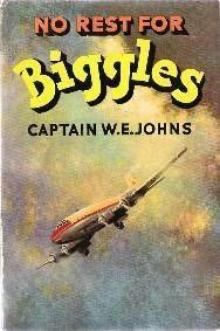 55 No Rest For Biggles
55 No Rest For Biggles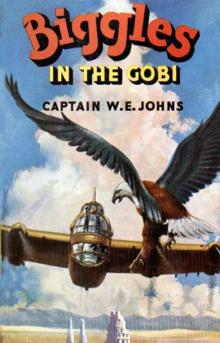 46 Biggles in the Gobi
46 Biggles in the Gobi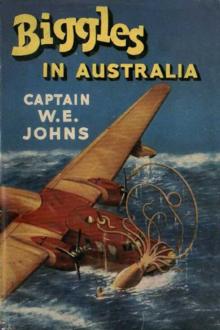 52 Biggles In Australia
52 Biggles In Australia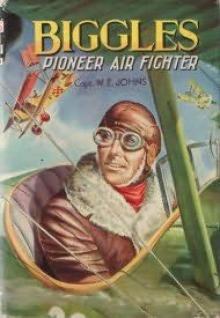 51 Biggles Pioneer Air Fighter
51 Biggles Pioneer Air Fighter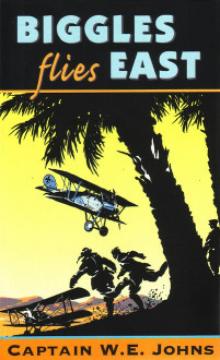 05 Biggles Flies East
05 Biggles Flies East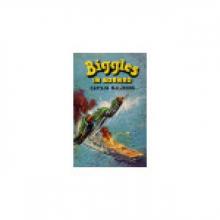 28 Biggles In Borneo
28 Biggles In Borneo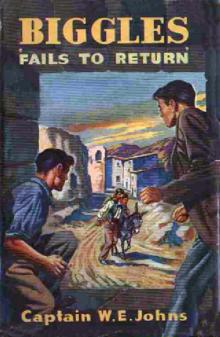 29 Biggles Fails to Return
29 Biggles Fails to Return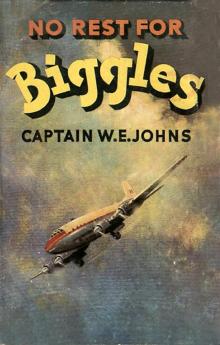 55 No Rest For Biggles (v2)
55 No Rest For Biggles (v2) Biggles Does Some Homework
Biggles Does Some Homework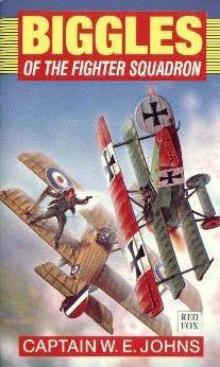 Biggles of the Camel Squadron
Biggles of the Camel Squadron 35 Biggles Takes A Holiday
35 Biggles Takes A Holiday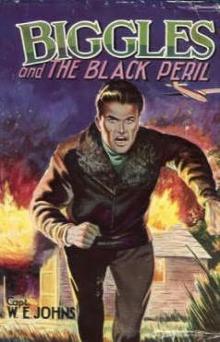 Biggles And The Black Peril (06)
Biggles And The Black Peril (06)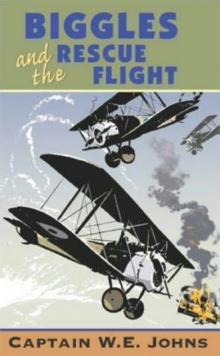 17 Biggles And The Rescue Flight
17 Biggles And The Rescue Flight Biggles Learns To Fly
Biggles Learns To Fly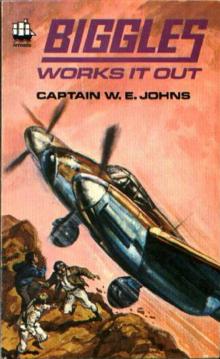 40 Biggles Works It Out
40 Biggles Works It Out 05 Biggles Learns To Fly
05 Biggles Learns To Fly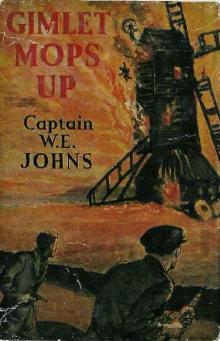 04 Gimlet Mops Up
04 Gimlet Mops Up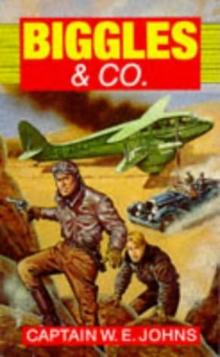 10 Biggles and Co
10 Biggles and Co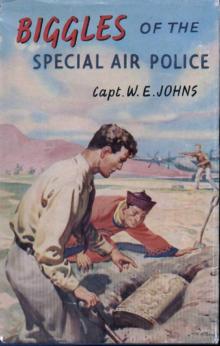 47 Biggles Of The Special Air Police
47 Biggles Of The Special Air Police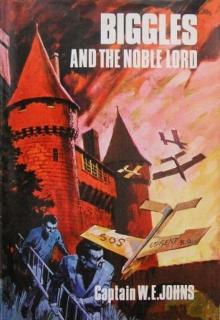 Biggles and the Noble Lord
Biggles and the Noble Lord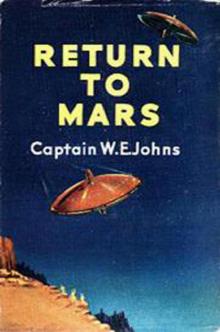 T2 Return To Mars
T2 Return To Mars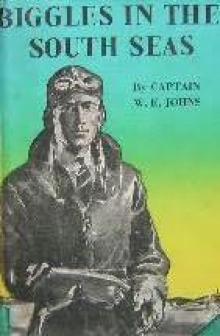 21 Biggles In the South Seas
21 Biggles In the South Seas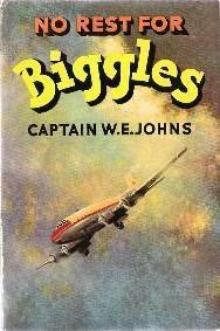 No Rest For Biggles
No Rest For Biggles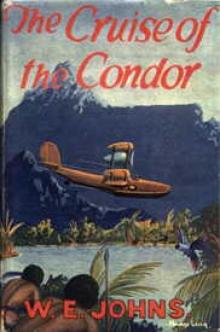 Biggles In The Cruise Of The Condor (02)
Biggles In The Cruise Of The Condor (02)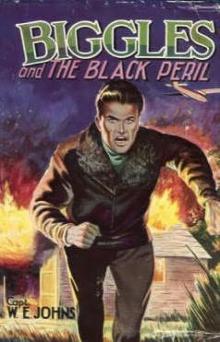 06 Biggles And The Black Peril
06 Biggles And The Black Peril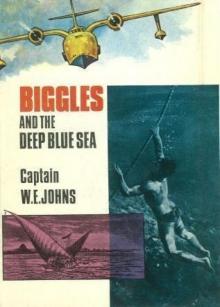 Biggles and the Deep Blue Sea
Biggles and the Deep Blue Sea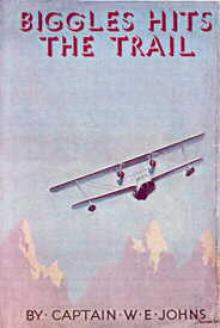 06 Biggles Hits The Trail
06 Biggles Hits The Trail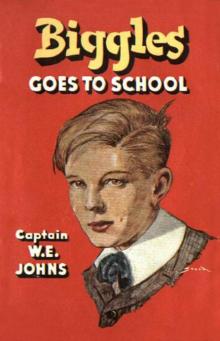 39 Biggles Goes To School
39 Biggles Goes To School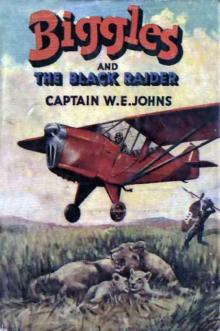 44 Biggles and the Black Raider
44 Biggles and the Black Raider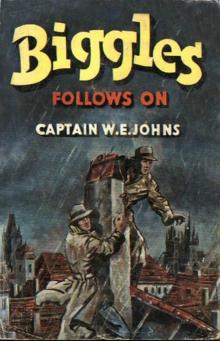 42 Biggles Follows On
42 Biggles Follows On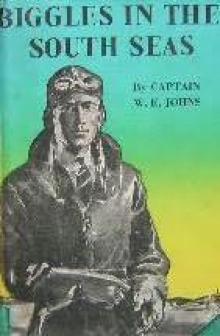 Biggles In the South Seas
Biggles In the South Seas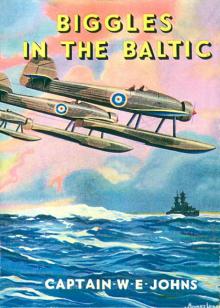 21 Biggles In The Baltic v3
21 Biggles In The Baltic v3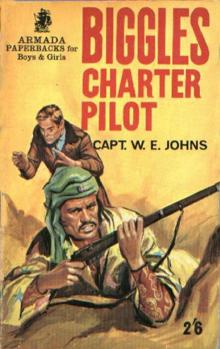 27 Biggles - Charter Pilot
27 Biggles - Charter Pilot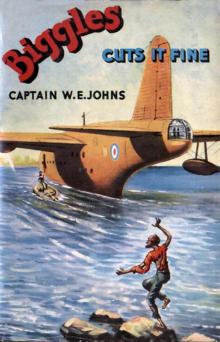 49 Biggles Cuts It Fine
49 Biggles Cuts It Fine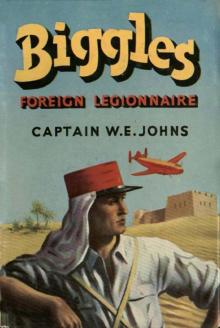 51 Biggles Foreign Legionaire
51 Biggles Foreign Legionaire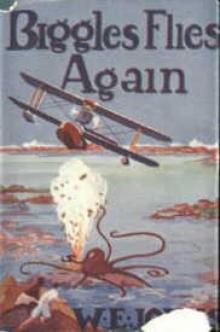 04 Biggles Flies Again
04 Biggles Flies Again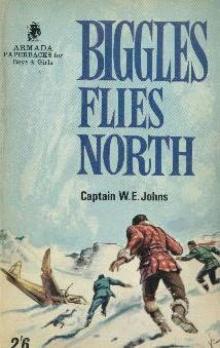 16 Biggles Flies North
16 Biggles Flies North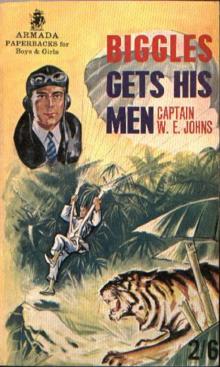 37 Biggles Gets His Men
37 Biggles Gets His Men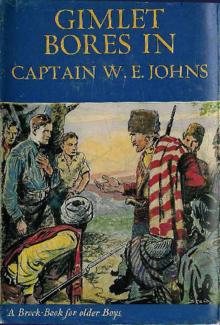 07 Gimlet Bores In
07 Gimlet Bores In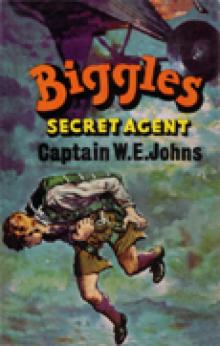 19 Biggles Secret Agent
19 Biggles Secret Agent 32 Biggles In The Orient
32 Biggles In The Orient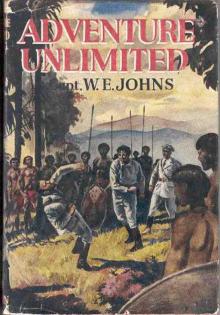 Adventure Unlimited
Adventure Unlimited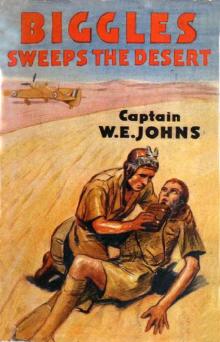 26 Biggles Sweeps The Desert
26 Biggles Sweeps The Desert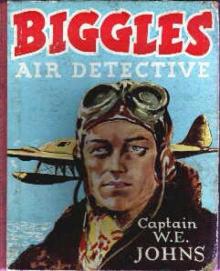 Biggles Air Detective (43)
Biggles Air Detective (43) 36 Biggles Breaks The Silence
36 Biggles Breaks The Silence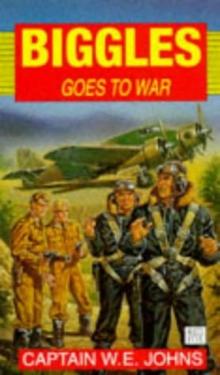 14 Biggles Goes To War
14 Biggles Goes To War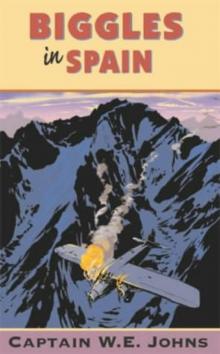 18 Biggles In Spain
18 Biggles In Spain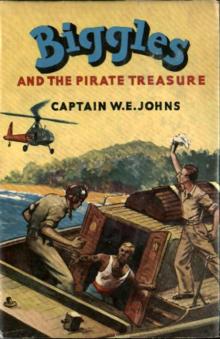 50 Biggles and the Pirate Treasure
50 Biggles and the Pirate Treasure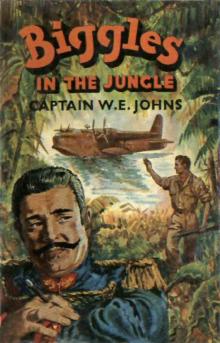 25 Biggles In The Jungle
25 Biggles In The Jungle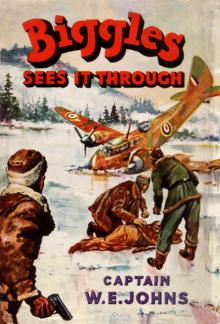 23 Biggles Sees It Through
23 Biggles Sees It Through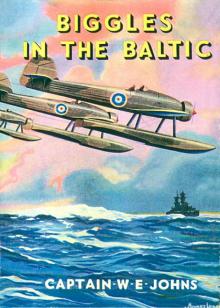 21 Biggles In The Baltic
21 Biggles In The Baltic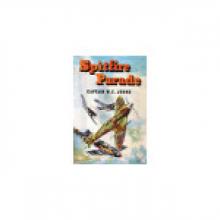 24 Spitfire Parade
24 Spitfire Parade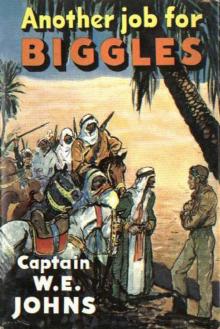 38 Another Job For Biggles
38 Another Job For Biggles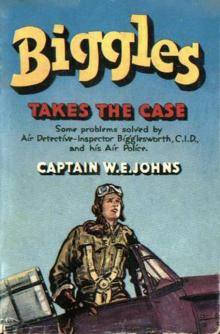 41 Biggles Takes The Case
41 Biggles Takes The Case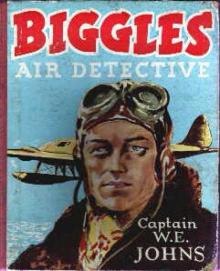 43 Biggles Air Detective
43 Biggles Air Detective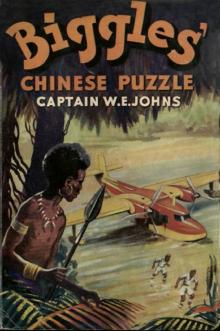 53 Biggles Chinese Puzzle
53 Biggles Chinese Puzzle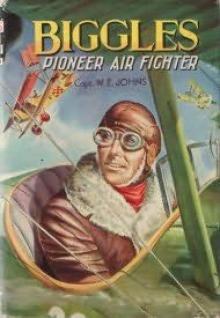 Biggles Pioneer Air Fighter (51)
Biggles Pioneer Air Fighter (51)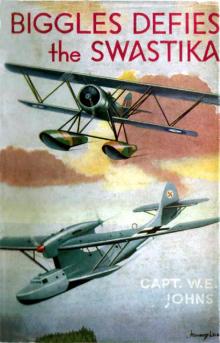 22 Biggles Defies The Swastika
22 Biggles Defies The Swastika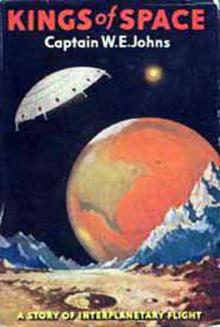 01 Kings Of Space
01 Kings Of Space